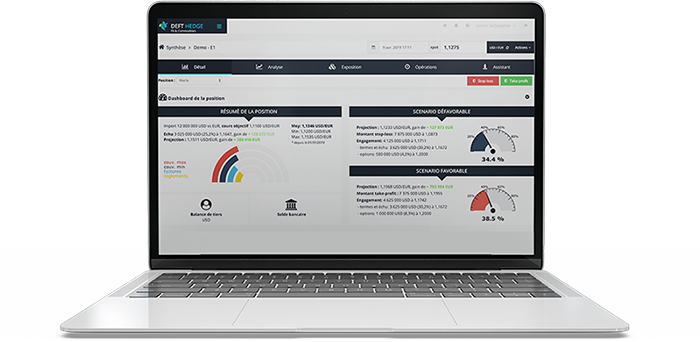Electricity Prices :
Discover our solution !

Difficult to store, electricity stands out as a unique commodity in the commodities market. Nevertheless, like other assets in this market, the price of electricity is subject to numerous fluctuations in its value.
In the event that you wish to sell or invest in this commodity, it is essential to identify the times when market conditions are most favorable.
To assist companies in their operations in the commodities market, it is important to have access to a maximum amount of information about this market and the developments in the prices of various assets. To meet this need, DeftHedge now offers a SaaS software, thus facilitating the management of commodities and the risks associated with these operations.
How does the electricity market work?
Origin of electricity traded on the market
The markets where electricity is traded ensure the balance between the supply and demand for electricity at the national level. Thanks to a substantial nuclear power capacity, electricity production in France can meet national consumption needs, with the possibility of even exporting a portion of the production depending on the season.
Indeed, during the winter period, France must turn to other European producers to meet higher demand. However, over the course of the year, France maintains a positive electricity export balance.
Operation of the electricity market
In French electricity production, only a small portion is consumed directly. The rest of the production is traded on the market, where three main types of actors can be found:
- Producers: This category of actors represents those who generate and sell electricity on the market (nuclear power plants, hydroelectric plants, etc.).
- Energy suppliers: These actors are the buyers on the market who then resell to consumers.
- Traders: This category of actors operates between the producers and energy suppliers.
Exchange Markets
Transactions carried out among these three main categories of actors occur on different types of specific markets:
- Exchanges: Exchanges with producers can come from different countries, as seen on the European exchange (EPEX SPOT).
- Over-the-counter (OTC) market: Transactions conducted directly between producers and suppliers without the involvement of traders.
- Intermediated OTC market: Traders are present in this type of market and act as intermediaries between producers and suppliers.
Types of traded products
Electricity transactions can take various forms on exchange markets, and several types of trading products can be highlighted:
- Spot Products: This type of product corresponds to electricity consumed in the short term. They can be further distinguished based on the consumption date: daily products, half-hourly products, hourly products, etc. The price of spot products can vary daily depending on supply and demand, as the price is set each day on the EPEX SPOT exchange.
- Futures Products: This type of exchange corresponds to products traded before the actual delivery date. With these contracts, suppliers can anticipate the cost of electricity based on future demand and thus avoid price increases when demand is particularly high.
The Electricity Market in France: A Specific Market
Before July 1, 2007, the electricity and gas market was not open to competition, and only EDF supplied electricity in the country.
Since the opening of the market to competition, new energy suppliers have emerged, completely changing negotiations with producers. This competition has also had an impact on the selling prices of this energy, which are now freely set by suppliers.
How is the price of electricity calculated?
In the commodities market, the value of each traded product is influenced by various external factors. Electricity is no exception to this rule, and its price will vary to a greater or lesser extent due to certain factors.
Being unable to be stored on a large scale, electricity must be consumed quickly. This characteristic implies a constant balance of the electrical grid. This specificity of electricity means that its value varies daily due to various factors:
- Demand: Electricity needs vary significantly throughout the day, with a decrease at night.
- Weather: Electricity demand increases significantly in winter due to heating needs.
- Production: Certain weather conditions (wind, sun) will have an impact on wind and solar power production.
These variations in supply and demand mean that the value of electricity can change from day to day and even within a single day. To better manage these fluctuations in electricity prices and the proliferation of actors (green energy producers and suppliers), the electricity market was created.
The goal of this market is to allow producers to quickly sell the quantity of electricity they produce to suppliers, thereby ensuring the continuous balance of the electrical grid.
This specific operation of the electricity market will, therefore, have an impact on the price of electricity. Among the factors that will also come into play in the calculation of electricity prices are:
- Production and supply costs
- Transmission and distribution costs
- Brokerage and negotiation costs
Having knowledge of all these factors is essential to accurately determine the price of electricity and its constant evolution.

How to invest in electricity effectively?
Like other commodities, electricity appears as an interesting asset for your investments. In the face of climate change, electricity plays an even more significant role in current energy consumption, especially renewable energy.
In constant development, new sources of renewable electricity are now present in exchange markets:
- Solar energy
- Wind energy
- Hydrogen
- Hydropower
- Biomass
To adopt a good investment strategy in the electricity market, it is important to keep in mind the multiple factors affecting electricity prices and the different solutions for renewable energy production.
To assist you in your investment strategy, DeftHedge offers you a tool designed to enable companies to make the best possible investments.
How will our commodity management software help you with electricity procurement?
Designed specifically to assist professionals in managing commodity risks, this software provides access to a wealth of information about the electricity market. With this tool, companies can accurately track the evolution of electricity prices and adapt their procurement or sales strategy accordingly.
To ensure that companies can conduct their operations confidently, this software also guarantees compliance with international accounting and financial standards. To establish an appropriate and efficient financial strategy, DeftHedge is the best possible support.
In the commodities market, electricity is a valuable commodity with numerous transactions, driven in part by the future prospects it represents. Indeed, with the development of green electricity, new opportunities are emerging, making electricity truly attractive.
To make the best possible investments in this commodity, the DeftHedge software features the “SmartStrategy” functionality, which allows you to simulate different strategies and determine the most optimal one.
Before committing to the electricity market, this feature will be a valuable aid in minimizing the risk of financial losses.
If you intend to invest in the electricity market, it is important to have a certain level of knowledge in the field and access to a maximum amount of information. Influenced by multiple factors, electricity prices can vary significantly within the same day.
To ensure that your investment strategy is as optimal as possible, DeftHedge offers its SaaS software solution. Gathering a wealth of information about commodity markets, including electricity, this tool becomes a real decision-making aid for businesses.
Whether you are a small business, a medium-sized enterprise, or a large corporation, DeftHedge becomes indispensable in your commodity management. With this powerful tool, you will have access to multiple features that are particularly advantageous for your daily management:
- Monitoring and managing electricity prices
- Assistance in implementing investment strategies
- Automation of time-consuming tasks
- Data centralization and security
- Financial gain optimization
Committed to effective cash flow management for businesses, DeftHedge is a perfectly tailored solution for positioning yourself in various financial markets. With this tool, companies will have access to a wealth of data to optimize their financial strategy in electricity trading.
To help you get started with this SaaS solution and facilitate the customization of this tool, DeftHedge experts are at your disposal to answer all your questions.
To identify the right time to invest in the electricity market, do not hesitate to discover all the powerful features of the DeftHedge software.
